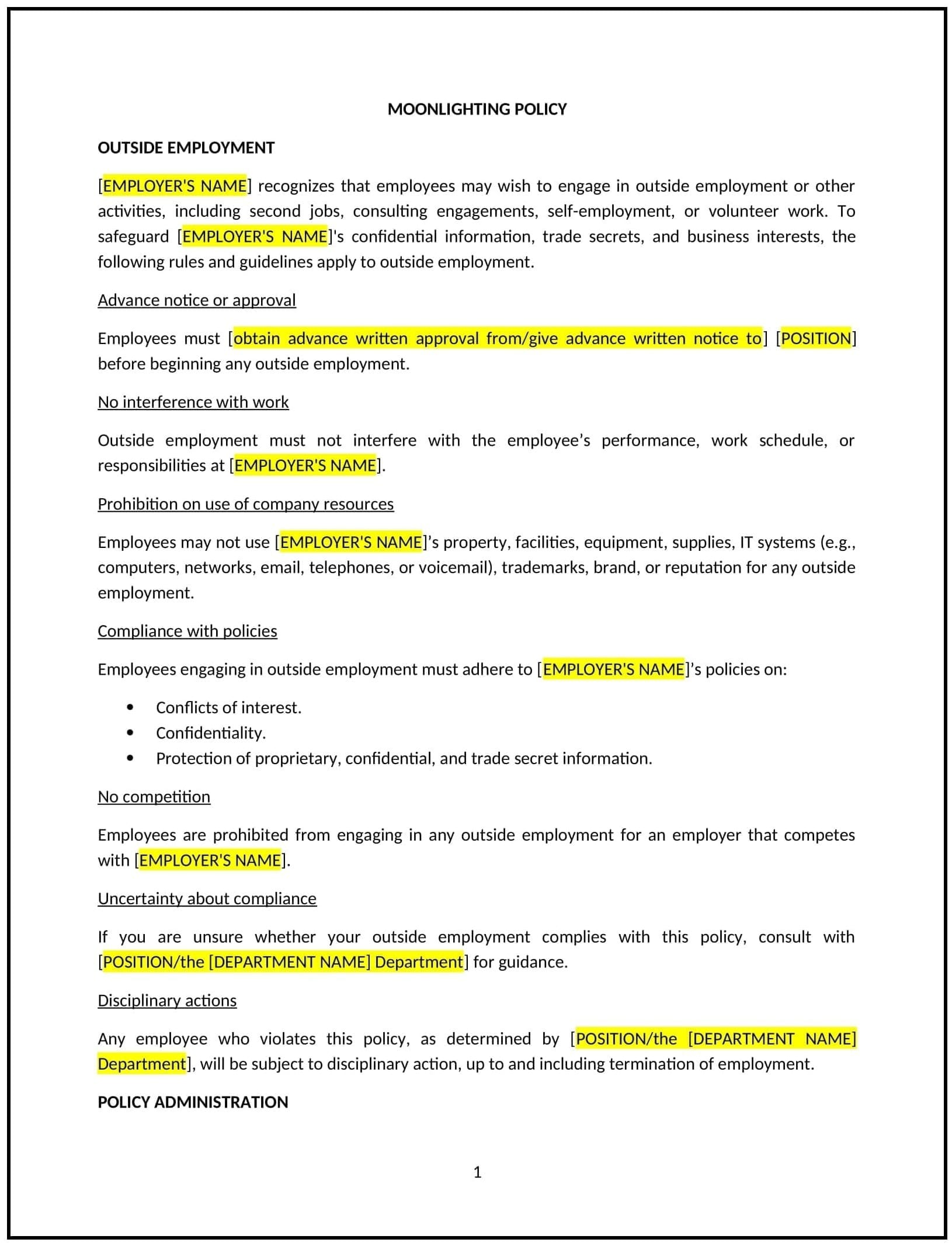Got contracts to review? While you're here for policies, let Cobrief make contract review effortless—start your free review now.

Customize this template for free
Moonlighting policy (Montana)
A moonlighting policy helps Montana businesses manage employee employment outside their primary role within the organization. This policy outlines the conditions under which employees may engage in secondary employment, ensuring that such activities do not conflict with the business's operations, intellectual property, or values.
By implementing this policy, businesses can protect their interests, maintain focus on core responsibilities, and support employees’ need for additional income, while minimizing risks related to conflicts of interest, performance, and confidentiality.
How to use this moonlighting policy (Montana)
- Define moonlighting: The policy should define what constitutes moonlighting, including any secondary employment or freelance work undertaken by employees outside their primary employment with the business.
- Set guidelines for secondary employment: The policy should specify the types of external work that are permitted, such as freelance work in the same industry or unrelated side projects, and outline any restrictions based on conflict of interest, confidentiality, or performance concerns.
- Address potential conflicts of interest: The policy should clarify that employees must not engage in moonlighting that competes with the business, uses proprietary information, or creates a conflict of interest. Employees should be required to disclose any potential conflicts.
- Establish reporting requirements: Employees should be required to notify their supervisor or HR department if they intend to take on secondary employment, particularly if it is within the same industry or has the potential to create a conflict.
- Set performance expectations: The policy should include provisions stating that moonlighting should not negatively impact the employee’s performance or availability for their primary role. If performance issues arise, the business may reassess the employee’s moonlighting activities.
- Clarify legal and ethical considerations: The policy should remind employees that moonlighting activities should comply with all applicable laws, including tax regulations, labor laws, and the company’s own policies on confidentiality and intellectual property.
- Review and update regularly: The policy should be reviewed periodically to address changes in business needs, legal requirements, or industry standards.
Benefits of using this moonlighting policy (Montana)
This policy provides several key benefits for Montana businesses:
- Reduces conflict of interest: By setting clear guidelines and disclosure requirements, businesses can prevent conflicts of interest or competitive activities that could harm the company.
- Protects intellectual property: The policy ensures that employees do not misuse proprietary information, trade secrets, or resources gained from their primary employment when engaging in secondary work.
- Maintains employee performance: By ensuring that moonlighting does not interfere with an employee’s main job, businesses can protect productivity and maintain high performance standards.
- Encourages transparency: The policy promotes open communication between employees and management regarding outside work, helping to manage expectations and address potential issues early.
- Increases employee satisfaction: A well-defined moonlighting policy allows employees the freedom to earn extra income without compromising their job security or facing undue restrictions.
- Reduces legal risk: The policy helps mitigate the risk of legal disputes related to external employment, intellectual property, and work performance, offering a clear framework for handling such matters.
Tips for using this moonlighting policy (Montana)
- Communicate the policy clearly: Ensure that all employees are aware of the moonlighting policy, the guidelines for secondary employment, and the importance of maintaining performance and confidentiality while engaging in outside work.
- Provide a transparent reporting process: Establish a simple, confidential process for employees to disclose their moonlighting activities to HR or their managers, ensuring that any potential conflicts are addressed in a timely manner.
- Monitor employee performance: Regularly assess employee performance to ensure that moonlighting activities are not negatively affecting their primary responsibilities. If performance issues arise, revisit the moonlighting agreement to determine whether adjustments need to be made.
- Encourage transparency: Encourage employees to be open about their moonlighting activities, especially when they have the potential to impact the company. This will help avoid misunderstandings and potential issues down the line.
- Review the policy periodically: Regularly review the moonlighting policy to ensure that it remains aligned with changing legal requirements, business needs, and employee concerns, ensuring that it stays relevant and effective.